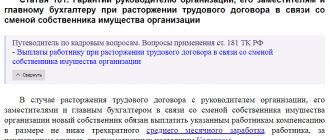Labor relations and relations directly related to labor relations between an employee and an employer are regulated by an employment contract and acts of the employer.
Under an employment contract, the employee undertakes to personally perform the work, comply with labor regulations, and the employer undertakes to provide the employee with work according to the specified labor function, ensure working conditions, and pay the employee wages in a timely manner and in full.
Grounds for termination of the contract
The grounds for termination of an employment contract are:
- Agreement of the parties;
- Expiration of the employment contract;
- Employer initiative;
- Employee initiative;
- Transfer of an employee to another employer;
- Circumstances beyond the control of the parties;
- Refusal of the employee to continue the employment relationship;
- Transfer of an employee to an elective job (position);
- Violation of the terms of an employment contract.
An employment contract can be terminated by agreement of the parties.
To do this, the party that has expressed a desire to terminate sends a notice of the planned termination to the other party, which within three working days notifies in writing of the decision made.
An employment contract concluded for a specific period is terminated upon expiration of the employment contract.
. If an employment contract is concluded for the duration of a specific job, the expiration date of the employment contract is the day the work is completed. An employment contract concluded for the period of replacement of a temporarily absent employee expires on the day the replaced employee leaves.
The employer is obliged to extend the term of the employment contract if a medical report on pregnancy is provided, or if the employee has a child under the age of 3 years. In this case, the employment contract is extended until the end of parental leave.
Commentary on Article 84.1 of the Labor Code of the Russian Federation
Provisions relating to the general procedure for formalizing the termination of employment relations were contained in several articles of the Labor Code (parts 2 and 3 of Article 62, part 6 of Article 66, part 3 of Article 77). Some issues, in particular, the obligation to familiarize the employee with the dismissal order in all cases, and not just when dismissal as a disciplinary sanction, have not been resolved. Therefore, the legislator supplemented the Labor Code with the commented article, establishing in it the general procedure for formalizing the termination of an employment contract. The general procedure (procedure) for registering the termination of an employment contract should be classified as general guarantees upon termination of an employment contract. In addition to general guarantees, the legislator provides additional (special) guarantees upon termination of an employment contract on certain grounds for termination of the employment contract (for example, under paragraphs 2, 3 of Article 81 of the Labor Code) or with a certain category of employees (for example, with minors, pregnant women and etc.).
In accordance with the commented article, the termination of an employment contract is formalized by order (instruction) of the employer. As a general rule, the right to issue an order, as well as to sign it, belongs to the person enjoying the right to hire and dismiss. This is usually the head of the organization or the person to whom such right is delegated. As for the employer - an individual, he signs the order (instruction) himself, but it is possible that he can assign this function to a specific employee.
The legislation does not determine the period for issuing an order to terminate an employment contract, nor the day on which the employer is obliged to familiarize the employee with it. It must be assumed that the order (instruction) to terminate the employment contract must be issued (signed) before the day of termination of the employment contract.
The commented norm provides for cases when the employer is deprived of the opportunity to familiarize the employee with the order (instruction): a) impossibility of bringing to the attention of the employee; b) the employee refuses to familiarize himself with the order. In this case, a corresponding entry is made on the order (instruction) indicating the reason why it was impossible to bring the order (instruction) to the attention of the employee, as well as record (possibly by drawing up a report) the employee’s refusal to familiarize himself with the order.
As a general rule, the day of termination of an employment contract is the last day of work. The exception is cases when the employee did not actually work, but his place of work was retained. Thus, when granting leave with subsequent dismissal, the day of dismissal is considered the last day of leave (see Article 127 of the Labor Code and commentary thereto).
On the day of termination of the employment contract, the employee must be issued a work book in which an entry is made in strict accordance with the wording of the Labor Code or other federal law with reference to the article, part of the article and paragraph (see Article 62 of the Labor Code and commentary to it), and a calculation is also made (Article 140 of the Labor Code).
A novelty should be considered the employer’s obligation to issue a work book upon a written request from an employee who has not received it after dismissal. The law sets a specific deadline - no later than three working days from the date of application. The day of application, presumably, will be the date of registration of the application or directly indicated in it. If the employer delays issuing a work book to the employee, the employer bears financial liability to the employee (Article 234 of the Labor Code).
Termination of contract at the initiative of the employer
Employment contract at the initiative of the employer
may be terminated in the cases established by article:
- Liquidation of an employer - a legal entity, or termination of the activities of an employer - an individual;
- Reduction in the number or staff of employees;
- Decrease in the volume of production, work performed and services provided due to the deterioration of the economic condition of the employer;
- Inconsistency of the employee with the position held or the work performed, confirmed by the results of certification;
- Repeated failure by an employee responsible for ensuring the safety and health of the organization to pass a knowledge test on these issues;
- Inconsistency of the employee with the position held or the work performed due to health status;
- Negative performance results during the probationary period;
- Absence from work without a valid reason for three or more consecutive hours in one working day;
- The employee being at work in a state of alcoholic, narcotic, psychotropic, or toxic intoxication;
- Refusal to undergo a medical examination to determine the presence of alcohol, narcotic, psychotropic, or toxicological intoxication;
- Violation of labor protection or fire safety rules by employees, which could lead to industrial injuries or accidents;
- Theft by an employee at the place of work of someone else's property, deliberate destruction of someone else's property, damage, on the basis of a court decision or sentence that has entered into force;
- Commitment of guilty actions or inactions by an employee at the place of work servicing monetary or commodity valuables, if this gave rise to a loss of confidence in him;
- When an employee performing educational functions commits an immoral act that is incompatible with the continuation of this work;
- Disclosure by an employee of information that is a state secret or other secret protected by law, known to him in connection with the performance of his job duties;
- Repeated failure to perform or improper performance of job duties in the presence of a disciplinary sanction;
- Provision by an employee of knowingly false documents or information when concluding an employment contract (if genuine documents or information could be grounds for refusal to conclude an employment contract);
- The employee’s absence from work for more than one month for reasons unknown to the employer;
- The employee reaching retirement age, etc.
At the same time, it is not allowed to terminate an employment contract with an employee who will reach retirement age within two years on the basis of a reduction in the number of staff or the employee’s inadequacy for the position held.
When terminating an employment contract due to a decrease in production volume, the employer is obliged to notify employees in writing 15 working days in advance. Moreover, such termination is possible if the following conditions are simultaneously met: closure of a structural unit, inability to transfer the employee to another job, written notification of employee representatives indicating the reason for termination.
Pregnant women who have provided the employer with a pregnancy certificate, who have a child under 3 years of age, and single mothers raising a child under 14 years of age cannot be dismissed at the initiative of the employer on the basis of a reduction in the number or staff of employees or a decrease in production volume.
UrDela.ru
Termination of an employment contract is formalized by order (instruction) of the employer.
The employee must be familiarized with the order (instruction) of the employer to terminate the employment contract against signature. At the request of the employee, the employer is obliged to provide him with a duly certified copy of the specified order (instruction). In the event that an order (instruction) to terminate an employment contract cannot be brought to the attention of the employee or the employee refuses to familiarize himself with it against signature, a corresponding entry is made on the order (instruction).
The day of termination of the employment contract in all cases is the last day of work of the employee, with the exception of cases where the employee did not actually work, but in accordance with this Code or other federal law, he retained his place of work (position).
On the day of termination of the employment contract, the employer is obliged to issue the employee a work book and make payments to him in accordance with Article 140 of this Code. Upon written application by the employee, the employer is also obliged to provide him with duly certified copies of documents related to work.
An entry in the work book about the basis and reason for termination of the employment contract must be made in strict accordance with the wording of this Code or other federal law and with reference to the relevant article, part of the article, paragraph of the article of this Code or other federal law.
If on the day of termination of the employment contract it is impossible to issue a work book to an employee due to his absence or refusal to receive it, the employer is obliged to send the employee a notice of the need to appear for the work book or agree to send it by mail.
From the date of sending this notification, the employer is released from liability for the delay in issuing the work book. The employer is also not responsible for the delay in issuing a work book in cases where the last day of work does not coincide with the day of registration of termination of employment relations upon dismissal of an employee on the basis provided for in subparagraph “a” of paragraph 6 of part one of Article 81 or paragraph 4 of part one of Article 83 of this Code, and upon dismissal of a woman whose employment contract was extended until the end of pregnancy in accordance with part two of Article 261 of this Code. Upon written request from an employee who has not received a work book after dismissal, the employer is obliged to issue it no later than three working days from the date of the employee’s application. ‹ Article 84 (Labor Code of the Russian Federation) Termination of an employment contract due to violation of the rules for concluding an employment contract established by this Code or other federal law Up Chapter 14. (Labor Code of the Russian Federation) PROTECTION OF PERSONAL DATA OF AN EMPLOYEE ›
Gubin Alexander
Termination of an employment contract is formalized by order (instruction) of the employer. The employee must be familiarized with the order (instruction) of the employer to terminate the employment contract against signature. At the request of the employee, the employer is obliged to provide him with a duly certified copy of the specified order (instruction). In the event that an order (instruction) to terminate an employment contract cannot be brought to the attention of the employee or the employee refuses to familiarize himself with it against signature, a corresponding entry is made on the order (instruction). The day of termination of the employment contract in all cases is the last day of work of the employee, with the exception of cases where the employee did not actually work, but in accordance with this Code or other federal law, he retained his place of work (position). On the day of termination of the employment contract, the employer is obliged to issue the employee a work book and make payments to him in accordance with Article 140 of this Code. Upon written application by the employee, the employer is also obliged to provide him with duly certified copies of documents related to work. An entry in the work book about the basis and reason for termination of the employment contract must be made in strict accordance with the wording of this Code or other federal law and with reference to the relevant article, part of the article, paragraph of the article of this Code or other federal law. If on the day of termination of the employment contract it is impossible to issue a work book to an employee due to his absence or refusal to receive it, the employer is obliged to send the employee a notice of the need to appear for the work book or agree to send it by mail. From the date of sending this notification, the employer is released from liability for the delay in issuing the work book. The employer is also not responsible for the delay in issuing a work book in cases where the last day of work does not coincide with the day of registration of termination of employment relations upon dismissal of an employee on the basis provided for in subparagraph “a” of paragraph 6 of part one of Article 81 or paragraph 4 of part one of Article 83 of this Code, and upon dismissal of a woman whose employment contract was extended until the end of pregnancy or until the end of maternity leave in accordance with part two of Article 261 of this Code. Upon written request from an employee who has not received a work book after dismissal, the employer is obliged to issue it no later than three working days from the date of the employee’s application.








